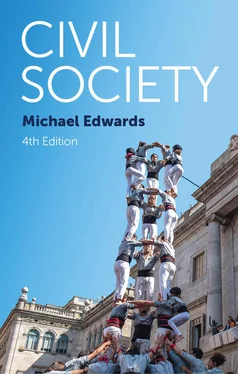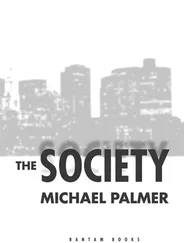At a more detailed level, it is useful to break down the developmental roles of civil society into three interrelated areas: economic, political, and social. The economic role of civil society centers on securing livelihoods and providing services where states and markets are weak, and on nurturing the social values, networks, and institutions that underpin successful market economies, including trust and cooperation. As Lester Salamon has shown, voluntary associations the world over have become key providers of human services (especially health and welfare), and now constitute a 2.2 trillion dollar industry in just 40 countries that were sampled. 13NGOs, religious organizations, and other civic groups have always been significant service providers; the difference now is that they are seen as the preferred channel for service provision in deliberate substitution for the state. In more radical formulations (such as the World Social Forum), civil society is seen as a vehicle for “humanizing capitalism” by promoting accountability among corporations, progressive social policies among governments, and new experiments in “social economics” that combine market efficiency with cooperative values.
In their social role, civil societies are seen as a reservoir of caring, cultural life and intellectual innovation, teaching people – at least according to the neo-Tocquevillians – the skills of citizenship, and nurturing a collection of positive social norms that foster stability, loosely collected under the rubric of “social capital.” In turn, social capital is seen as the crucial ingredient in promoting collective action for the common good or simply creating and maintaining the social ties that are essential if individuals are to function effectively in modern economies where the demands of exchange are increasingly complex. The normative effects of voluntary associations lie at the core of the neo-Tocquevillian argument, though this is as much a moral as a social issue for them. In some ways this is to be expected because many neo-Tocquevillians are conservatives, and conservatives tend to look back in time to recreate what they consider to be the best of times, defined according to a particular set of moral standards. On the other hand, those on the left tend to look forward to better times to come, so they pay more attention to civil society as a vehicle for creating new solutions. The relative marginalization of theories of the public sphere is partly explained by the ascendancy of conservatives and conservative thinking in western politics.
In their political role, voluntary associations are seen as a crucial counterweight to states and corporate power and an essential pillar of promoting transparency, accountability, and other aspects of democratic governance. Especially where formal citizenship rights are not well entrenched, it is civil society that provides the channels through which most people can make their voices heard in government decision making, protect and promote their civil and political rights, and strengthen their skills as future political leaders. Arguing from democratic theory, a strong civil society can prevent the agglomeration of power that threatens autonomy and choice, provide effective checks against the abuse of state authority, and protect an open and inclusive public sphere. Take “participatory” or “citizen budgeting,” for example, which has spread across the world from Brazil over the past thirty years in an effort to open up the process of allocating public resources. An independent evaluation undertaken in 2018 showed that – although such experiments have lost some of their initial focus on social justice – they have definitely contributed to greater transparency, accountability, and popular participation. 14Progress is usually slow, unspectacular, and subject to reverses (especially during authoritarian setbacks, as happened in Brazil itself in 2018), but there has been progress nonetheless, 15and in this progress the health and strength of associational life is one important factor, whether in the context of protecting human rights, advancing peace negotiations, enriching the cultural life of communities, or producing a measurable decline in crime and violence. 16More broadly, the role of NGOs and social movements in mobilizing opposition to authoritarian rule and supporting progress toward multi-party elections has been well documented in Africa, Eastern Europe, Latin America, and the Middle East. Since the early 1990s, these functions have been extended to the global level, with NGO networks becoming increasingly influential in challenging the policies of the international financial institutions and establishing new norms of accountability. Civil society in this sense means “people power” writ large.
Nevertheless, we also know that in countries like Vietnam, Algeria, and Russia, associations can actually support authoritarian or semi-authoritarian rule, partly because they have little choice but to accede to government agendas. The broader success of social movements as a democratizing force is heavily dependent on context. 17Citizen budgeting has made important gains, but it hasn’t transformed the state or democratized the political process in any of the countries in which it has been introduced. The Arab Spring has already turned to winter in Egypt and beyond, with the movements that drove the non-violent revolution of 2011 retreating under renewed autocratic rule. And in Europe and the United States, the widening rifts that have opened up over issues like immigration seem to be forcing people further apart instead of bringing them together, with few civil society groups able or willing to bridge the divide and some actively promoting it. Questions have been raised about the legitimacy and accountability of civic groups engaged in global politics, and about “who belongs” in civil society at a time when hate groups and violent extremists of different stripes have found a home. 18Perhaps too many hopes were loaded onto the shoulders of voluntary associations during this period, leading to exaggerated notions of their political importance and their ability to replace the nation-state (a fantasy akin to “grasping at straws,” according to David Rieff). 19As these critics point out, voluntary associations of different kinds make a fundamentally important contribution to social progress, but they only tell one part of the civil society story.
As a result of these criticisms and disappointments, there have been signs that interest and support for civil society have begun to wane, confirming Alan Wolfe’s judgment that the “idea of civil society failed because it became too popular.” 20“Civil society is passé” was the conclusion of a senior German government official in private conversation; “it had its moment in the 1990s but now it’s time to move on to something else.” 21Or take China, where the role of NGOs was placed on a par with the nation-state in official communiqués from 2002, but where “civil society” had been added to the list of “things it is now forbidden to discuss” a mere eleven years later. 22In this sense, the years after the fall of communism may come to be seen as the high water mark of the civil society movement.
Whether the idea of civil society recovers from these setbacks depends on how successfully these doubts and criticisms are addressed moving forward, but the critiques themselves are helpful. They remind us that civil society is, and should continue to be, the subject of debate. Yet in this debate it is no longer possible to regard civil society as irrelevant to politics and economics, or to dismiss it as the preserve of a subset of privileged individuals or regions of the world – the citizens of the Greek polis , white male property owners in eighteenth-century Europe, or the West, the North, or the South. Ideas about citizen action, the good society, public participation, the power of protest, and freedom of information and association have spread across the globe to become a powerful reference point in political debates and an inspiration for activists worldwide. However, these debates continue to be dominated by a narrow and disputed interpretation of what civil society is and does, and this narrowness threatens to erode its potential as a force for positive social change. Building on this potential requires a simultaneous broadening of the debate to include other, less dominant, perspectives and a much greater specification of how each of these perspectives contributes to a clearer understanding overall. And the best place to start that process is by breaking apart the assumptions that underpin the orthodox interpretation of civil society as the world of associational life.
Читать дальше












